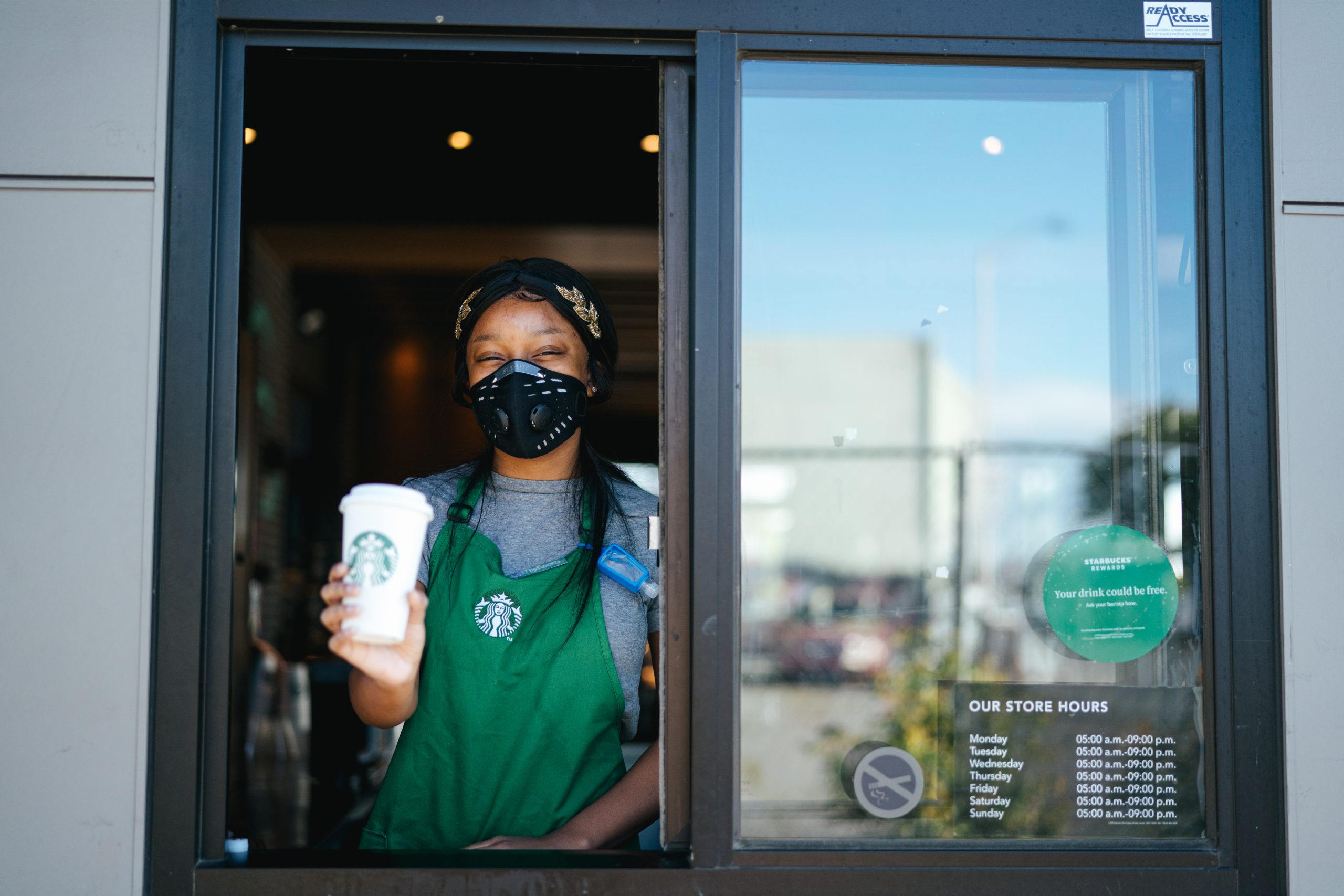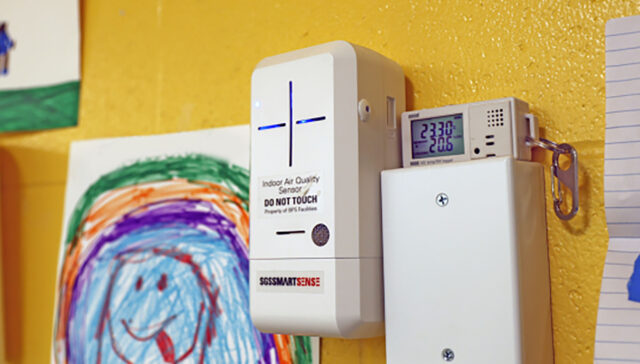Students collaborate with Starbucks to track COVID policy changes

Through a partnership between Starbucks and SPH ’s idea hub, students from the Schools of Public Health, Social Work, and Hospitality Administration populated a database with COVID policy regulations and public health guidelines that have impacted retail businesses during the pandemic.
When COVID-19 cases in the United States began to surge again last fall, states and cities started imposing a flurry of executive orders and public health guidance to mitigate the spread of the virus and save lives. From indoor dining restrictions to mask mandates, many of these state and local policies began changing on a daily basis, posing operational challenges for retail businesses as they adjusted accordingly to keep their employees and customers safe.
During the fall 2020 semester, 14 Boston University students embarked on a bold initiative with the Starbucks Coffee Company to track COVID-19 policies affecting retail businesses and restaurants in the US and Canada, organizing this information into a database for Starbucks employees (called partners) to reference as they facilitate store re-openings and implement safety protocols unique to each of their cafes in North America.
The collaboration is a novel partnership between the global coffee giant and the School of Public Health, and one of the first relationships spearheaded by SPH’s recently formed idea hub that aims to bridge the gap between public health and private industry.
The collaboration
Students from SPH, the School of Hospitality Administration (SHA), and the School of Social Work (SSW) worked closely with Paul Shafer, assistant professor of health law, policy & management, and Starbucks corporate partners to populate the COVID Community Information Exchange (CCIE), a database that the company created to code state and local regulations and public health guidelines that have impacted retail businesses. The project satisfied the MPH practicum requirement for several of the SPH students.
“This collaboration with Starbucks is very exciting for SPH and idea hub, but it is most of all an extremely valuable learning experience for our students to see firsthand how complex health policy can be in the middle of a public health emergency,” says Shafer, who is the principal investigator of the CCIE. “There is a lot of nuance and detail that goes into not only finding these policies, but distilling their complex language down to what a cafe manager can actually understand and respond to.”
“Our foundational guiding principle at Starbucks is to prioritize the health and safety of our partners and our customers,” said Becky Elias, director of global retail quality assurance for Starbucks, during a meeting with idea hub’s advisory committee in the fall. “Extreme differences across our jurisdictional mandates made us quickly realize we needed to create our own protocols grounded in what the science tells us for the health and safety of our partners.”
Throughout the semester, the students met weekly with Shafer and the Starbucks project team, including data scientists, lawyers, engineers, and experts in food safety and retail, several of whom have backgrounds in public health.
Student experience
Omobolanle Adams (SPH’21), who studied epidemiology and biostatistics at SPH and completed the MPH program in December, was eager to merge her quantitative data skills with policy work as she researched regulations and guidelines issued in Southern states, including Louisiana, Alabama, and South Carolina. She probed through government orders on physical distancing, travel restrictions, school closures, hand washing, mask wearing, and senior-only retail hours of operation.
“Although all of my states were in the South, it was interesting to see how each state’s executive orders, guidelines, and re-opening phases still differed from each other,” says Adams. “Some states issued a lockdown in early March, and others not until July, and then certain states had gathering limits of 25 people, versus 100 people in other states.”
Allison Burton (SHA’20), an SHA student pursuing a Master of Management in Hospitality (and an alum of the SHA undergraduate program), researched mandates in Iowa, Michigan, Minnesota, and Wisconsin. This project was her first deep dive into studying health and safety protocols in the restaurant industry, and she updated the database frequently as governors in the Midwest increased restrictions to combat the continued rise in cases.
“The best part of this project was being able to collaborate with everyone and learn about all of the changing requirements for restaurants and customers,” says Burton. “The Starbucks team was so knowledgeable, and it was great to work with their data scientists, engineers, and lawyers.”
Laying a foundation for the future
Mekedelawite (Maya) Atakilti, a dual-degree student in the MPH/MSW program, says she appreciated the opportunity to lay the foundation for policies that promote safe working conditions for essential workers, during and after the pandemic.
“I have family members who work in restaurants and are directly impacted by these types of policies,” says Atakilti, who herself worked in a small restaurant that was forced to shut down during the pandemic to assess how to implement the new safety orders and guidelines into its operational framework. Restaurant owners whose first language is not English face additional barriers in comprehending the often complex or vague language in the regulations, she says.
“When I started the project, I thought about how these restaurant owners are looking at and implementing this data, and how states can do a better job of making their guidelines more readily available to people and easier to follow,” says Atakilti, who reviewed mandates in Virginia, West Virginia, Ohio, and North Carolina. For example, most states last fall had implemented mandates for face coverings, but few state guidelines indicated what businesses should do if a customer refuses to wear a mask, she says. “It’s really difficult to parse through all of the information and make sure that you’re following all of the guidelines correctly.”
The students valued the guidance they received from the Starbucks team as the project became more complicated—and more crucial—with each passing week of record-breaking COVID-19 case totals in the US.
“The Starbucks team had confidence in our skills and listened to our concerns,” says Adams. “It really meant a lot to me as a student for them to say that my opinion is valued.”
Public health is infused in all industries
“This partnership with Starbucks demonstrates how public health is infused in all industries and the important role employers play in promoting public health,” says Vanessa Edouard, managing director of idea hub. “This project exemplifies what we are hoping to accomplish with idea hub: It draws on faculty expertise to meet an important business need, while also providing an excellent learning opportunity for our students—all toward the goal of improving population health.”
The original article was posted on BUSPH’s Latest News. page.




